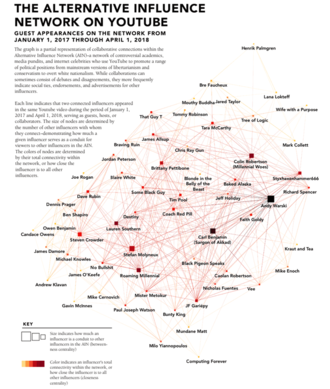Investigating The Link Between Algorithms, Radicalization, And Mass Shootings

Table of Contents
The Role of Social Media Algorithms in Radicalization
Social media algorithms, designed to maximize user engagement, often prioritize sensational and emotionally charged content. This inadvertently leads to the amplification of extreme viewpoints and the creation of "filter bubbles" and "echo chambers." These online environments reinforce pre-existing beliefs and limit exposure to diverse perspectives, creating fertile ground for radicalization.
-
Amplification of Extreme Viewpoints: Algorithms prioritize content that elicits high engagement – likes, shares, comments – regardless of its veracity or nature. This means that inflammatory, extremist content can quickly spread, reaching far wider audiences than it might otherwise.
-
Filter Bubbles and Echo Chambers: Algorithms personalize content feeds, showing users more of what they've already interacted with. This creates "filter bubbles," limiting exposure to differing viewpoints, and "echo chambers," where like-minded individuals reinforce each other's biases, leading to the normalization and even escalation of extreme beliefs.
-
Targeted Advertising: Sophisticated targeting techniques allow advertisers to reach specific demographics with tailored messages. Extremist groups exploit this, using targeted advertising to expose individuals to radicalizing content, even if they haven't previously expressed interest in such material.
-
Examples: Several platforms, including Facebook, YouTube, and Twitter, have faced criticism for their role in the spread of extremist content through their algorithms. Studies have shown how algorithmic recommendations can lead users down "rabbit holes" of increasingly extreme content.
-
Case Studies: Analysis of online activity preceding acts of violence has revealed patterns of engagement with extremist content amplified by algorithms, highlighting the need for deeper investigation into this link.
Misinformation and Disinformation's Influence on Violent Extremism
The spread of misinformation and disinformation, often facilitated by algorithms, plays a significant role in fueling violent extremism. Algorithms, designed to maximize reach, can inadvertently or intentionally promote false or misleading information related to violence and extremism.
-
False and Misleading Information: Algorithms struggle to differentiate between accurate and inaccurate information. This allows false narratives and conspiracy theories surrounding violence and extremism to spread rapidly and effectively.
-
Spread of Conspiracy Theories and Hate Speech: Algorithms can inadvertently promote the spread of conspiracy theories that dehumanize certain groups, justifying violence against them. Similarly, hate speech, often disguised as opinion, is amplified, creating a toxic online environment.
-
Bots and Automated Accounts: Sophisticated bots and automated accounts are used to amplify misinformation campaigns, creating an illusion of widespread support for extremist views and overwhelming legitimate counter-narratives.
-
Content Moderation Challenges: Platforms face immense challenges in effectively moderating content, especially at scale. The constant evolution of manipulative tactics makes it difficult to stay ahead of harmful content. Fact-checking initiatives, while crucial, often struggle to keep pace with the rapid spread of misinformation.
-
Psychological Impact: Constant exposure to misinformation can significantly impact individuals' perceptions of reality, making them more susceptible to extremist ideologies and potentially leading to radicalization.
The Limitations of Current Content Moderation Strategies
Current content moderation strategies, often relying on a combination of automated systems and human review, face significant limitations in effectively addressing the spread of extremist content.
-
Difficulties in Identification and Removal: Algorithms struggle to consistently identify subtle forms of extremist content, such as coded language or dog whistles. Human moderators are often overwhelmed by the sheer volume of content, leading to delays in removing harmful material.
-
Ethical Dilemmas and Censorship Concerns: Balancing the need to remove harmful content with concerns about freedom of speech presents a significant ethical challenge. Overly aggressive content moderation can lead to accusations of censorship and stifle legitimate debate.
-
Limitations of AI-Powered Moderation: While AI-powered moderation tools can be helpful, they are not foolproof. They can be biased, miss crucial context, and are vulnerable to manipulation by sophisticated actors.
-
Need for Human Oversight and Collaboration: Effective content moderation requires a combination of advanced technologies and human oversight. Increased collaboration between platforms, researchers, policymakers, and civil society organizations is crucial.
-
Algorithmic Bias: The algorithms used for content moderation can themselves be biased, leading to the disproportionate removal of content from certain groups or viewpoints.
The Need for Interdisciplinary Collaboration
Addressing the complex issue of algorithms, radicalization, and mass shootings requires a concerted effort from diverse stakeholders.
-
Interdisciplinary Research: Collaboration between researchers from computer science, sociology, psychology, political science, and other fields is crucial to gain a comprehensive understanding of the problem.
-
Collaboration between Stakeholders: Improved communication and data sharing are necessary between technology companies, policymakers, law enforcement agencies, and mental health professionals.
-
Role of Mental Health Professionals: Understanding the psychological factors that contribute to radicalization is vital. Mental health professionals can play a crucial role in identifying and addressing these underlying issues.
Conclusion
The relationship between algorithms, online radicalization, and mass shootings is undeniably complex, but ignoring the role of technology in this tragic phenomenon is irresponsible. Social media algorithms, while designed to maximize engagement, can inadvertently amplify extremist ideologies and contribute to the spread of misinformation, potentially influencing vulnerable individuals towards violence. Current content moderation strategies face significant challenges, demanding a multi-faceted approach.
Understanding the intricate connection between algorithms, radicalization, and mass shootings is crucial. Further research, interdisciplinary collaboration, and improved content moderation strategies are urgently needed to mitigate the risks associated with the misuse of technology and prevent future tragedies. Let's work together to effectively address the role of algorithms in radicalization and work towards a safer online environment. We must continue investigating the link between algorithms, radicalization, and mass shootings to build a more resilient and informed society.

Featured Posts
-
 Guillermo Del Toro On Immersive Game Worlds Game Name Stands Out
May 30, 2025
Guillermo Del Toro On Immersive Game Worlds Game Name Stands Out
May 30, 2025 -
 Saying Goodbye Evan Longoria Retires From The Tampa Bay Rays
May 30, 2025
Saying Goodbye Evan Longoria Retires From The Tampa Bay Rays
May 30, 2025 -
 Insults Whistles And Gum The Unfair Treatment Faced By Opponents At The French Open
May 30, 2025
Insults Whistles And Gum The Unfair Treatment Faced By Opponents At The French Open
May 30, 2025 -
 Rueckblick 10 April Bedeutende Ereignisse Und Persoenlichkeiten
May 30, 2025
Rueckblick 10 April Bedeutende Ereignisse Und Persoenlichkeiten
May 30, 2025 -
 Gorillazs House Of Kong A 25th Anniversary Retrospective
May 30, 2025
Gorillazs House Of Kong A 25th Anniversary Retrospective
May 30, 2025
Latest Posts
-
 Tim Hieu Ve Sophia Huynh Tran Va Thanh Tich Pickleball An Tuong
May 31, 2025
Tim Hieu Ve Sophia Huynh Tran Va Thanh Tich Pickleball An Tuong
May 31, 2025 -
 Six U Conn Teams Achieve Perfect Multi Year Apr Scores
May 31, 2025
Six U Conn Teams Achieve Perfect Multi Year Apr Scores
May 31, 2025 -
 Sophia Huynh Tran Con Duong Thanh Cong Trong The Gioi Pickleball
May 31, 2025
Sophia Huynh Tran Con Duong Thanh Cong Trong The Gioi Pickleball
May 31, 2025 -
 Alcaraz Rut Lui Khoi Ban Ket Indian Wells Masters
May 31, 2025
Alcaraz Rut Lui Khoi Ban Ket Indian Wells Masters
May 31, 2025 -
 Ban Ket Indian Wells Hanh Trinh Cua Alcaraz Ket Thuc
May 31, 2025
Ban Ket Indian Wells Hanh Trinh Cua Alcaraz Ket Thuc
May 31, 2025
